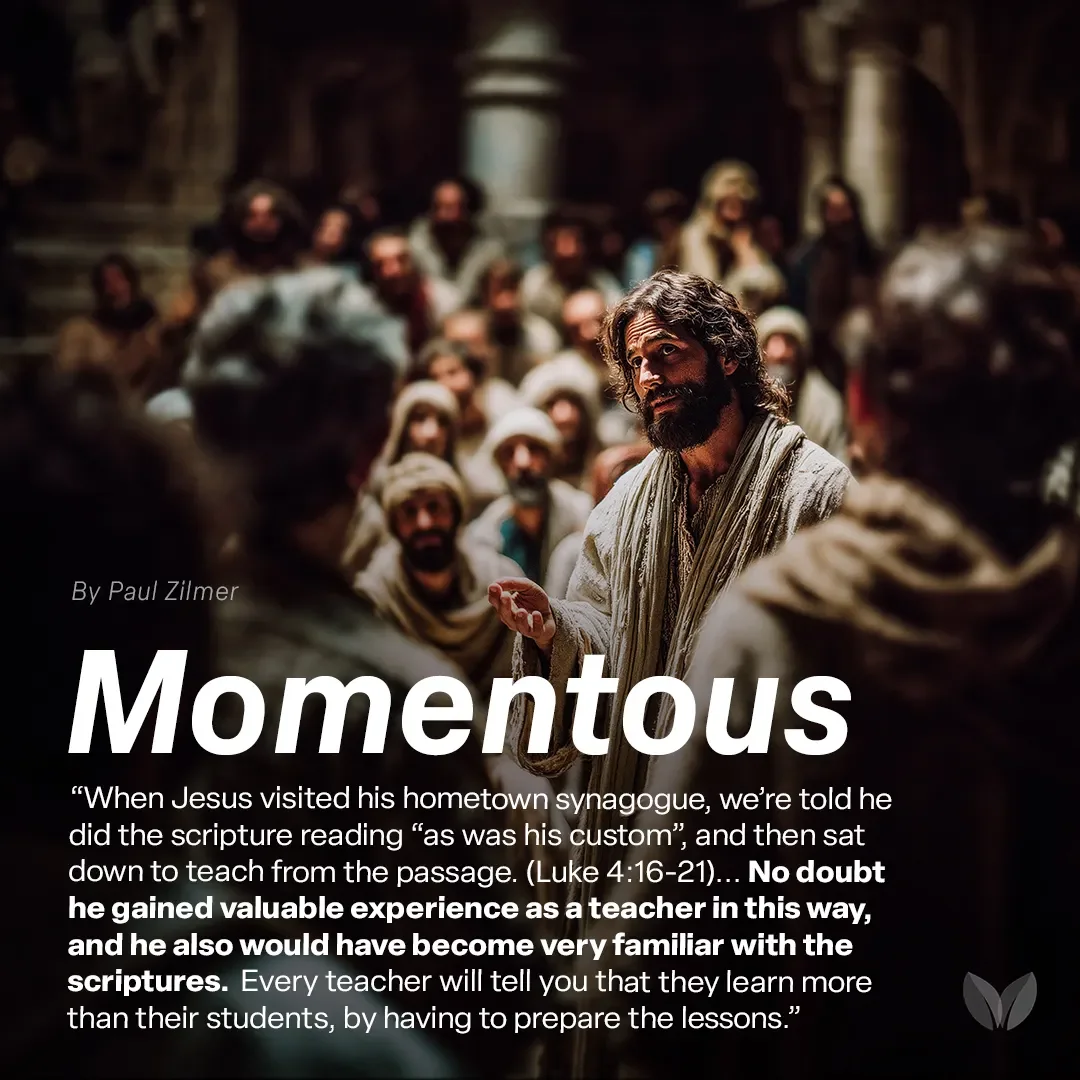Momentous
When Jesus visited his hometown synagogue, we’re told he did the scripture reading “as was his custom”, and then sat down to teach from the passage. (Luke 4:16-21) It’s here we learn that Jesus had acted as a rabbi (perhaps not the rabbi) in this synagogue for some time, prior to the official start of his ministry. No doubt he gained valuable experience as a teacher in this way, and he also would have become very familiar with the scriptures. Every teacher will tell you that they learn more than their students, by having to prepare the lessons.
On this occasion, Jesus read a short passage from Isaiah:
The Spirit of the Lord GOD is upon me, because the LORD has anointed me to bring good news to the poor; he has sent me to bind up the brokenhearted, to proclaim liberty to the captives, and the opening of the prison to those who are bound; to proclaim the year of the LORD's favor… (Isaiah 61:1-2a)
You may have noticed the little “a” there. That indicates that only the first phrase of verse 2 is included. Jesus stopped reading there, in the middle of a sentence. Why would he do that?
Verse 2b (the second part) reads, “…and the day of vengeance of our God; to comfort all who mourn…” After the reading Jesus sat down to teach, and his teaching was: “Today this Scripture has been fulfilled in your hearing.” Maybe you’ve read this enough times that it no longer registers how momentous this was. This chapter in Isaiah, and indeed surrounding chapters as well, is about the establishment of God’s Kingdom. To claim fulfillment means to claim the beginning of the Kingdom. It’s a claim that Messiah has come. (Notice the word “anointed” used by Isaiah—the Hebrew word is Messiah.)
But not all of it was fulfilled. Jesus was indeed the “anointed”. He did indeed bring good news, bring comfort to the brokenhearted, did proclaim liberty and proclaim the Lord’s grace. But: He did not usher in the vengeance of God, nor was all mourning ended, nor was any of the rest of Isaiah’s prophecy in the following verses accomplished.
The fulfillment of verses 1-2a, Jesus says, was accomplished by his ministry. Right then. The remainder has yet to be fulfilled even now—it awaits his second advent. Just reading Isaiah 61, we would never grasp that there was a division there. The first momentous thing Jesus taught was that Messiah had arrived. The second momentous thing was that all of Messiah’s work would not be completed at once. There would be a gap. The good news was proclaimed, yes, however it was going to take time—a lot of time as it turns out—for the good news to be disseminated as the Lord God intended.
Jesus announced the arrival of the Kingdom of God, however not yet the world-spanning literal reign foretold by the prophets. That will come, most assuredly. In the meantime, we do have the good news, the binding up, the liberty, the Lord’s grace, proclaimed by the one Anointed to do the job.
This concept—the Kingdom having begun at Jesus’s first advent, yet we’re all still waiting for the Kingdom to fill the earth at the second—is particularly evident in Luke. I urge you to take the time to do a search on “kingdom” in Luke, as a beginning. But then expand the range to all Kingdom prophecies. I believe you’ll find that what Jesus did in Nazareth that day is a pointer for how to read Kingdom passages. Some truly focus just on the coming worldwide reign. But many are like Isaiah 61, and Jesus teaches us to look for the aspects of the good news of the Kingdom which are “fulfilled this day in your hearing.” And respond by honoring the Anointed King, obeying him, living our lives in service to him, now and (we hope) for all time.
Love, Paul


